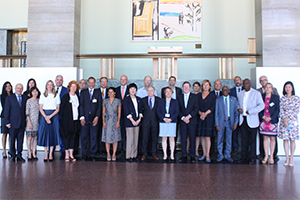
Following the third session of its Advisory Board, held in Geneva on 3 September 2019, the UN Road Safety Fund will be launching its first formal call for project proposals.
The Fund will disburse USD 4 million to finance selected projects aimed at contributing to reduce global road traffic fatalities, giving priority to individual country and multi-country projects having immediate and tangible impact.
The call is expected to officially open in early October 2019, when details on funding parameters and application process will be published on the Fund’s web page.
Project proposals shall be submitted through one of the ten Fund participating UN organizations, and will be assessed in line with the Fund's Global Framework Plan of Action for Road Safety and Funding Criteria and Priorities.
The Global Framework Plan guides the Fund’s support to low- and middle-income countries in addressing key gaps in their National Road Safety Systems. It does so by focusing on applying the safe system approach in road safety management: safe users; safe vehicles; safe roads; and effective post-crash response, and addressing them as the essential blocks for developing an integrated and effective national road safety system.
In addition to deciding on the formal call for project proposals, the Advisory Board invited UNESCO to become a Fund participating UN organization in view of its importance in promoting the safe system principles of the Global Framework Plan through education.
Furthermore, the Advisory Board reviewed progress in the implementation of the five pilot projects approved by the Fund’s Steering Committee in November 2018.
Worth nearly USD 1 million and implemented in Côte d’Ivoire, Egypt, Ethiopia, Pakistan, Paraguay, Philippines, Senegal and South Africa, the pilot projects focus on improving the collection of road traffic fatality data, strengthening speed management, enhancing legal frameworks for road safety, scaling up safe street designs, and developing capacity in child-responsive urban planning and sustainable urban transportation.
Note to Editors
About the UN Road Safety Fund
Established in April 2018, the UN Road Safety Fund aims to contribute to two major outcomes, assisting UN Member States to (a) substantially curb the number of fatalities and injuries from road traffic crashes, as well as to (b) reduce economic losses resulting from these crashes. Building on the best practices and expertise in road safety, the Fund will focus on supporting concrete actions helping to achieve the road safety-related targets of the Sustainable Development Goals (SDGs).
The Secretariat of the Fund is hosted by UNECE.
About the Advisory Board
The Advisory Board meets on an annual basis and provides strategic direction to the Fund. It advises on criteria for project proposals, monitoring and evaluation, on priorities for funding projects, on the organizational structure and consultations. The members of the Advisory Board are:
- UN Secretary-General’s Special Envoy for Road Safety
- Chair of the Global Forum for Road Traffic Safety (UNECE WP.1)
- Chair of the Steering Committee of the UN Road Safety Fund
- Member States representing each of the United Nations Regions, selected by United Nations Regional Commissions: Argentina, Lebanon, Nigeria, Russian Federation, Sweden
- Member State donors: European Commission
- Civil society: Federation Internationale de l’Automobile, Global Alliance of NGOs for Road Safety
- Research and academia: Institute for Road Safety Research (SWOV), the Netherlands; Korea Automobile Testing & Research Institute (KATRI), Republic of Korea
- Private sector donors: FIA Foundation, Total Corporate Foundation, Pirelli
- World Bank
- UNECE
- World Health Organization

